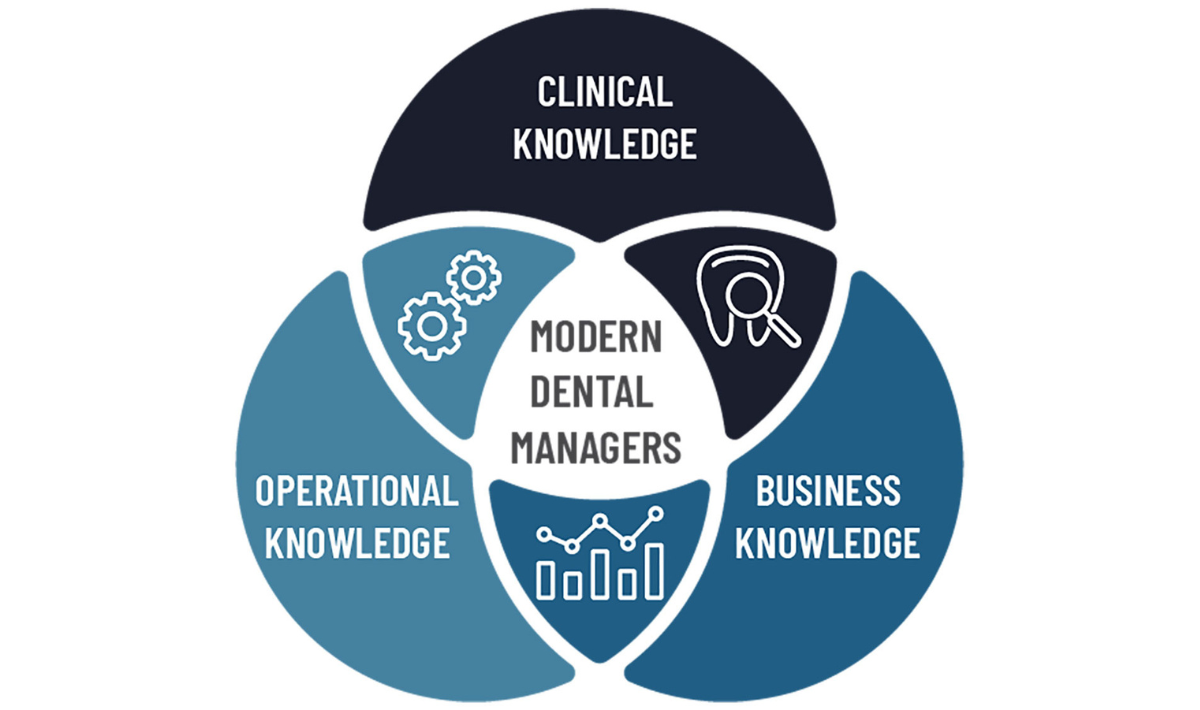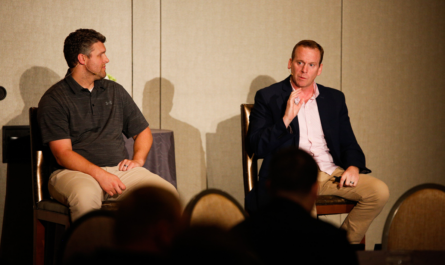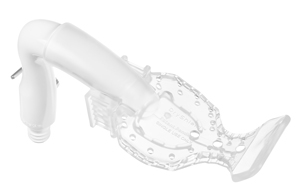The operational and interpersonal skills needed to succeed as an office manager in today’s dental
group practice setting.
By Camie Worley, Implementor & Coach, DEO
Dental office managers wear many hats when leading their teams. They must show up to work each day with a positive attitude, ready to use their strengths to guide and support office staff. It is no easy feat to master day-to-day optimization, team engagement, and dental systems all at the same time within an office leadership role.
Successful dental managers know exactly how their business runs, communicating with all office personnel, including front office staff, team members, and doctors. They must balance connecting with people interpersonally while also delegating tasks, coaching staff members up, implementing structure, and much more.
The role
So, what exactly is the role of an office manager? And how do company leaders hire into these positions? Time management has shifted over the years to the idea of a “modern dental manager,” where managers are actively leading people. In this model, instead of an office manager having 25 to 30 tasks they complete all by themselves, they recognize that they must only manage systems, but not be the ones doing daily tasks.
With such a range of responsibilities, it can be difficult for a dental office manager to connect with staff on a personal level, while also being firm with them and setting boundaries.
Dental managers starting out, or seeking to improve in their role, should begin by outlining non-negotiables for team members, making it clear that if the rules are broken, there will be consequences. It is also important for dental managers to find a balance with rule setting to avoid becoming more of a micromanager than a supporter within an office space.
Office managers should ensure that they have a handful of guidelines for their staff that are clear and consistently enforced to create workplace structure. These guidelines will additionally allow staff members to improve each day within their positions.
Read further for the skills of a strong dental manager:
Leading an office
When leading employees, managers should always refer to the company’s core values for structure and guidance. The company-wide core values should clearly explain what is expected from employees. Emphasizing the importance of core values within each person’s role keeps them focused on optimizing their work in the right direction.
Sometimes, a manager can find that too many people are responsible for the same task within a practice. To address this, have separate KPIs that each employee tracks for their position so that their roles are individualized.
As a manager, it is important to understand roles within the organization should they need temporary (or permanent) replacement. Knowing the expectations of each position and what is needed to perform not only helps in a bind but also allows managers to train from experience, which can help set employees up for success.
Proper guidance
Office managers should structure organizations where team members have the space to complete tasks and office managers manage what is getting done. So, how does an office manager properly do this? Read on for three components to properly guide teams:
No. 1: How do you find the right people for the right seat?
When KPIs for office managers include employee retention, it can lead to them holding onto people who aren’t necessarily the right fit. A patient’s in-office experience is important, and it requires the right people in the right positions. Patients can be as needy as they want, and dentists are always there to meet the needs of their patients. Make sure that each employee is equipped with the knowledge and skills for their job, and evaluate if they have the heart, care, and passion to succeed. If they have all these abilities, it will be shown in the first 90 days. However, if an employee early on is showing up late, complaining, or can’t physically do the tasks, they may not be the right fit for the company.
No. 2: How does an office manager give teams clarity and structure?
If teams express the need for more clarity or day-to-day structure at work, a dental leader should schedule a team-wide meeting and be clear and open with employees. Collaborate with employees, ask for their thoughts, and decide where the lack of clarity is among everyone.
As a manager, it is crucial to address any issues or confusion among staff right away so that it doesn’t compound or spiral out of control. When making team-wide decisions, consider team values, and how the decision aligns with them. Create a floor in any meeting where employees can voice their concerns and keep issues open to discussion.
No. 3: Why is it important to foster positivity throughout the day?
To maintain staff morale, have a regular team huddle at the start of the day, the end of the day, or both. Have teams start in huddles by sharing something good that took place in the office, or by calling out things that are wins from that day or the day before.
Employees should have a team huddle agenda, and a leader should make sure that the meeting stays positive, keeping momentum and morale up.
Make sure team leads understand that huddles are a necessary time to create positivity and to get everyone into the right headspace. Allowing a team member to lead meetings is a large part of delegating as a manager; managers must understand that some tasks require coaching.
When delegating a task, set the expectations, let go of the reigns, let employees get their feet wet, and then come back and coach them on what they missed, making sure that they truly understand. With time, employees will improve, and they can one day take over the task on their own.
Difficult conversations
One of the most important skills a manager needs to learn and master is how to have difficult conversations. This can also be one of the most intimidating skills for a manager, but remember, when we avoid difficult conversations we trade short-term discomfort for long-term dysfunction. When a difficult conversation is necessary, be sure to start a meeting by letting employees know that you, as a manager, value them and their position, and be upfront with them that this meeting is to discuss a difficult topic, and hopefully, we come to an agreeable solution. Starting this way will help ensure that everyone feels respected and heard despite the topic. Then, explain to the employee the reason for the meeting. Focus on keeping a constructive tone rather than blaming or accusing the employee. Come to meetings like these prepared, with clear data that shows a lack of consistency in their performance or adherence to the company’s policies, or from the employee in meeting their position’s KPIs. Avoid using words that express your personal feelings toward the employee, but rather keep the conversation geared toward areas of performance where there can be a resolution.
Ask the employee if there is something that you as a manager can do to help them improve or how you can best train them to be a good fit within the organization. Before the conversation concludes, ensure that the employee feels as though they can successfully complete their work. Don’t forget to create an action plan with the employee with clear expectations and deadlines for improvement. In some cases, a follow-up meeting or conversation may be needed.
A manager may deal with a defensive employee in a difficult meeting. If this happens, consider the possible ramifications of both keeping the employee vs. letting them go to find success somewhere else. If the employee truly seems to be a wrong fit for the company and your core values, it may be best to part ways rather than prolong the inevitable. Whatever decision you make, know that you have to live with the outcome of that decision. Managers must develop their skills and training in hiring/firing as well as when to hire/fire, as this is a part of overall leadership skills.
Office managers can learn and improve by sharing their experiences with colleagues at other locations or people in the organization who have held their positions. Other managers’ experiences are beneficial when determining how to manage a dental office. Managers need to know that there are always others in their shoes. Lean on each other and learn from each other; it’s okay to not know everything.
It takes skills and experience to excel as a dental office manager, and guidelines set in place through DEO can provide the foundation of support that office managers need as they grow in their roles. Always focus on the positives, seek assistance from other office managers, and know that within an office manager role, you are always learning and growing.
Camie Worley started as a dental assistant with her family dentist while she was looking into nursing programs. She fell in love with the industry and has worked as a clinical manager for a family dental group, and as a Director of Operations for a nationwide mobile dental organization. Worley was hired as a community manager at the DEO in January 2020, right before the onset of COVID-19, and now works with leading dental organizations as a DEO Implementor and Operations Coach.






